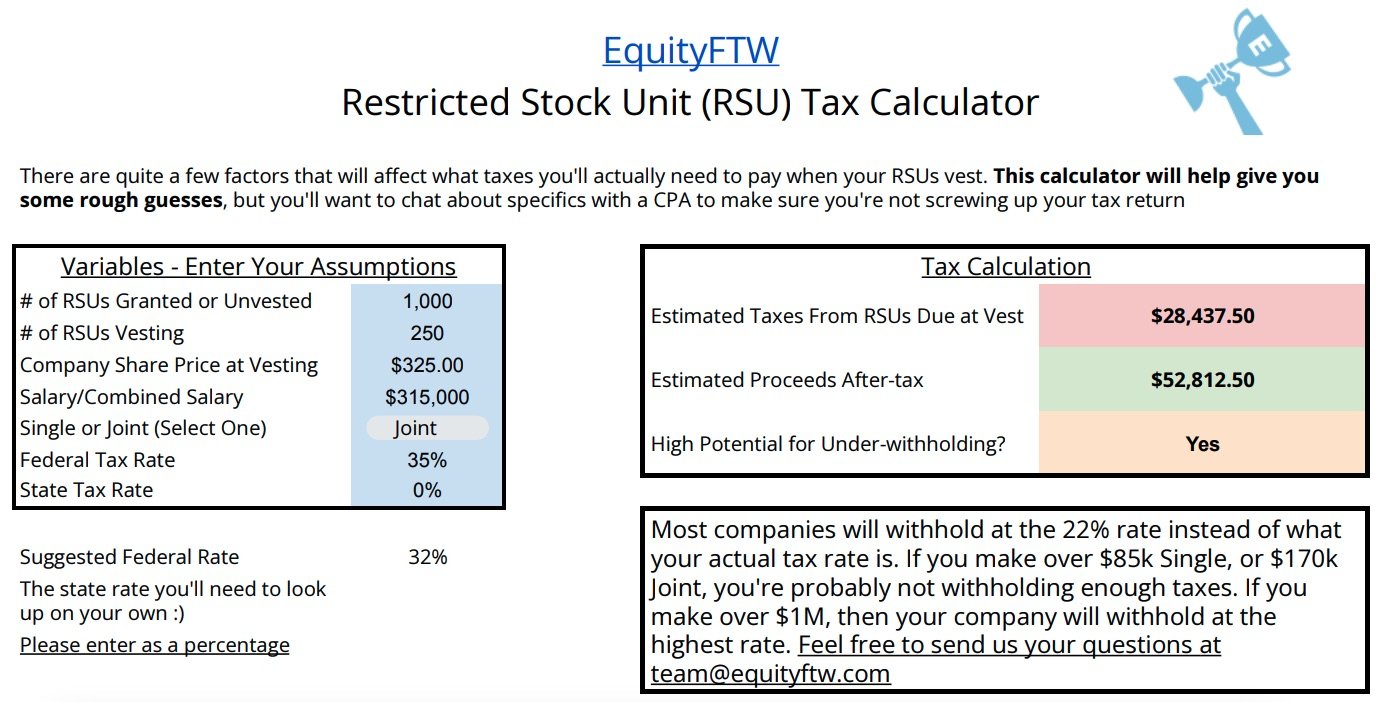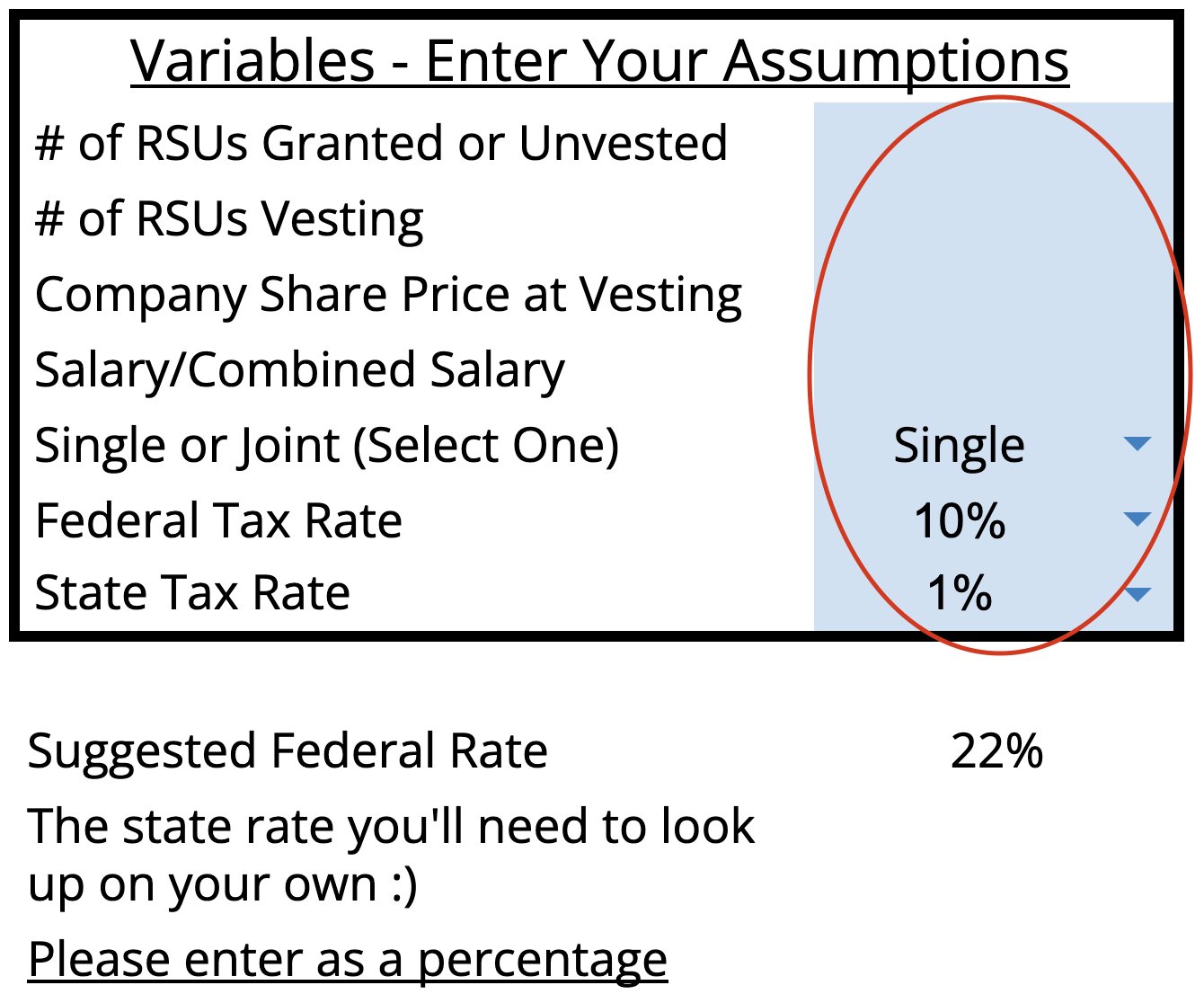Restricted Stock Unit (RSU) Tax Calculator
Calculating the taxes on your RSUs isn’t terribly difficult, but it’s also not the easiest thing if you aren’t familiar with RSUs, how they’re taxed, or taxes in general.
While we’ve written a lot of content on RSUs, we built this RSU tax calculator to save you some time from needing to build one on your own.
Here’s what our latest RSU tax calculator looks like. It’s built in Google Sheets and we’ve provided a link below so you can make a copy to keep for yourself.
How to use the RSU Tax Calculator
Step 1 - Download a Copy
To get the most out of the RSU calculator, you’ll want to download a copy of it for yourself. This links we’ve provided should prompt you to make a copy of the calculator. Once you follow the link, click the “Make a Copy” button and you’ll then have your very own RSU Tax Calculator.
Step 2 - Enter Assumptions
There are 7 assumptions that you’ll need to enter before the calculator will spit out the RSU tax results. They are circled in the image below:
As you can see, you’ll need to enter the # of granted or unvested RSUs, the # of RSUs that will be vesting, the company share price at the time of vesting, your salary or joint salary, whether you file single or joint, and lastly, the tax rates.
For federal and state tax rates we’ve included a dropdown of possible tax rates so you can select from a list rather than entering a percentage on your own.
Please note, for the RSU calculator to work, you must enter a value for each of the 7 assumptions for anything to calculate.
Step 3 - Edit Federal Tax Rate Assumption
Determining your tax rate can be difficult if you’ve never done it before, and the way we’re doing it in this calculator is only meant to be an estimate. After you take into consideration different credits and deductions, you could be in a lower tax bracket, but we don’t look at any of that, our formula calculations are relatively simple.
To help you determine your federal tax rate, a suggested federal tax rate will appear based on the assumptions you entered in the calculator. You’re still able to select any rate from the dropdown that you would like, you aren’t forced to use the recommendation.
On the second tab of the RSU tax calculator, we’ve provided the 2024 tax tables for your reference. This is helpful so you can get a visual sense of where you fall in the tax brackets.
Step 4 - Edit State Tax Rate Assumption
For your state tax rate, it’d be too much for us to pull each state’s income tax and include it. So it’s up to you to select a percentage from the dropdown. We’ve capped the state income tax rates at 15%.
Even if your state doesn’t have income taxes, you must still enter a value of 0% for the calculator to allow calculations to be made.
Step 5 - Review Outputs of RSU Tax Calculator
Once all the assumptions have been entered, the RSU tax calculator will provide three outputs and they are all pretty self-explanatory:
Estimated Taxes From RSUs Due at Vest - This shows the estimated taxes you’ll owe from your RSUs vesting. It’s based on your current tax rate and there’s a possibility it will differ from what’s on your paystub.
Estimated Proceeds After-tax - This shows the amount that you can expect to receive from your vesting RSUs after you pay taxes. You’ll probably receive a different amount than what’s listed here, but it’ll give you a general idea.
High Potential for Under-withholding? - This is an important output as it will tell you if there is a chance your employer didn’t withhold enough taxes for you as your RSUs vested. Most employers will withhold taxes on your RSUs at a rate of 22%, but you could easily be in a higher tax bracket than that.
Plan For the RSU Vesting Event
Once you’ve used the RSU tax calculator to determine your estimated taxes and estimated proceeds, you’ll want to make a plan so you know what you want to do with your company shares after the vesting date.
Do you need to set aside some extra cash for taxes?
Do you want to sell shares of your company stock now that the RSUs have vested?
If so, how much and what will you do with the cash?
If not, how long do you plan on holding on?
We’ve written some articles to help you decide how much company stock you should keep, but no matter what you decide, you’ll want to make sure you’re making the most of your RSUs as you hit each vest date.
After each vest happens you’ll probably wonder if there’s anything you can do to avoid taxes on vesting RSUs. The linked article provides you with 10 strategies you can use to avoid taxes on your RSUs.
It’s also important to be aware that if you don’t file your taxes properly, you could end up paying tax on RSUs twice.
Future RSU Tax Calculator Plans & Conclusion
Sometimes simple calculators are better. We’re getting close to finally launching a more robust RSU tax calculator so we’ll be sure to share it once it’s ready.
If you have suggestions or improvements for the current RSU tax calculator, please reach out so we can incorporate your suggestions into the next version.
Please feel free to share the link with those who need it.
As always, reach out to team@equityftw.com with any questions.





